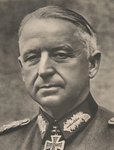parsifal
Colonel
Comparing Allie and German commanders is in many ways like comparing apples to oranges. Whereas the German commanders were trained to exploit success, look for weaknesses, and seize opportunities, they were not that strong on combined operations, or working toward a strategic goal. they tended to to see, and deal, only with that issue that was immediately in front of them. Rommels last offensive in NA is a classic example of this.
This tended to make them appear as poor strategists.
By comparison, the Allied generalls were trained to stick to the operational plan much more rigidly, and to consider the higher needs of the theatre as a whole. They were, in other words, much more "strategically" oriented. But this emphasis came at the cost of tactical prowess. This was because the Allied commanders tended to be much less flexible than their Axis opponents.
However, the Allies also learned to co-ordinate theatre assets much more effectively than the Axis. It was quite common for an Allied general to command the land, air and sea assets within his theatre of operations. Examples of this might be Eisenhower, Mountbatten, and Macarthur. This happened to a far lesser extent in the axis camp
This tended to make them appear as poor strategists.
By comparison, the Allied generalls were trained to stick to the operational plan much more rigidly, and to consider the higher needs of the theatre as a whole. They were, in other words, much more "strategically" oriented. But this emphasis came at the cost of tactical prowess. This was because the Allied commanders tended to be much less flexible than their Axis opponents.
However, the Allies also learned to co-ordinate theatre assets much more effectively than the Axis. It was quite common for an Allied general to command the land, air and sea assets within his theatre of operations. Examples of this might be Eisenhower, Mountbatten, and Macarthur. This happened to a far lesser extent in the axis camp

